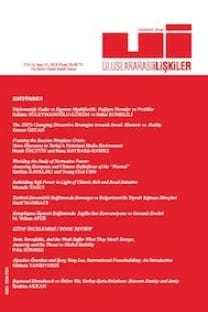Uluslararası İlişkiler Teorileri Işığında Avrupa Bütünleşmesi
Uluslararası ilişkiler disiplinindeki geleneksel ve çağdaş tartışmalar Avrupa bütünleşmesine dair entellektüel çalışmaları da doğrudan etkilemiştir. Avrupa bütünleşmesi sürecinin ilk yirmi yılındaki kuramsal çalışmalara uluslararası ilişkilerdeki idealizm-realizm çatışmasının bir uzantısı olan "yeni-işlevselciliğe karşı hükümetlerarasıcılık" tartışması damgasını vurmuş; 1980'lerden günümüze de uluslararası ilişkiler disiplininde gündemde olan "rasyonalizme karşı konstrüktivizm" tartışması Avrupa bütünleşmesini kuramsal düzeyde inceleyenleri etkisi altına almıştır. Bu çalışmanın amacı bütünleşme sürecine dair kuramsal çalışmaların genel bir değerlendirmesini yapmak ve Avrupa Birliği'nin geçmişinin, bugünün ve geleceğinin hangi teoriler çerçevesinde açıklanabileceğini ortaya koymaktır. Çalışmada, Avrupa bütünleşmesinin mevcut yapısının ve varacağı noktanın tek bir kuram etrafında incelenemeyeceği, her bir teorinin Avrupa bütünleşmesinin yalnızca bir parçasını ya da bir dönemini açıklayabildiği yaklaşımı benimsenmektedir.
Anahtar Kelimeler:
Avrupa bütünleşmesi, Avrupa Birliği, Yeni-işlevselcilik, Hükümetlerarasıcılık
European Integration in the Light of the International Relations Theories
This article contends that most of the intellectual work on European integration reflect major dichotomies between the theories of International Relations. During the first few decades of the integration process, the core European integration debate involved idealism-oriented neo-functionalists and realism-oriented intergovernmentalist approaches; whereas the current scholarship on European integration mirrors the main division that has emerged within the discipline of International Relations since 1980' s between rationalists regarding the integration process as the product of conscious member states' behaviour and constructivists focusing on policy-formation based on norms and common values. The main purpose of this article is to analyse the evolution of European integration within the context of the traditional and contemporary debates of International Relations. Since the sui generis nature of the integration process in the shape of the European Union constitutes a barrier to theorizing efforts in general terms, this article argues that each theory can only explain some pieces of the integration puzzle.
___
- ......
- ISSN: 1304-7310
- Başlangıç: 2004
- Yayıncı: Uluslararası İlişkiler Konseyi Derneği İktisadi İşletmesi
Sayıdaki Diğer Makaleler
İşgal Sonrası Irak'ta Olanlar Sıradan Bir Güvenlik Sorunu mu?
Uluslararası İlişkiler Teorileri Işığında Avrupa Bütünleşmesi
Uluslararası İlişkilerin "Gerçekçi" Teorisi: Kökeni, Kapsamı, Kritiği
Kuzey Kore'nin Nükleer Silah Programı: Sebepler ve Sonuçlar
Bilgi Sosyolojisi Açısından 'Doğu' ve 'Batı'
Şanghay İşbirliği Örgütün'ün Geleceği ve Çin
Uluslararası İlişkilerin “Gerçekçi” Teorisi: Kökeni, Kapsamı, Kritiği
